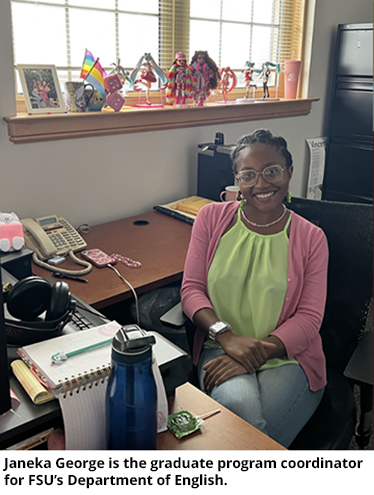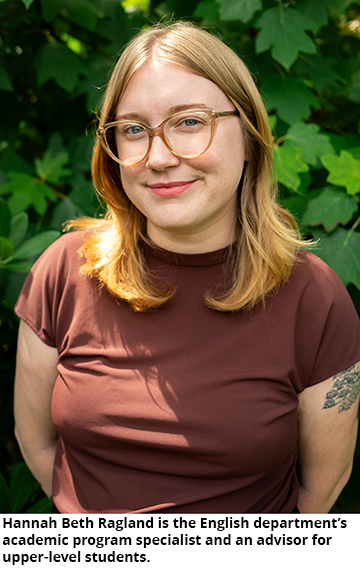Helpful information to know before applying for graduate school
By Emily Wilmot
Investing in yourself and enriching your knowledge is a good decision, wherever you are in life. For some, a splendid way to take action is by going to graduate school.
Your first step toward doing so should be to determine if graduate school is the best path for you. Many careers do not require a graduate degree but pursuing one may be helpful in several circumstances.  Starting your career and then attending graduate school is very common, too, and sometimes a more advantageous decision.
Starting your career and then attending graduate school is very common, too, and sometimes a more advantageous decision.
“You should feel financially and mentally ready to take on the responsibility of graduate school—graduate school will always be there, unchanging,” says Janeka George, graduate program coordinator for Florida State University’s English department. “But your financial and mental health have the ability to get better, to better accommodate your graduate school journey.”
Graduate school applications can be overwhelming, as information is scattered across various sources. An untapped well of resources is available within the English department and through FSU to help you along the process and to impress admissions.
English Associate Professor Meegan Kennedy is also the associate chair of undergraduate studies for the department, and she says that excelling in classes as an undergraduate is essential for anyone determined to apply for graduate school.
“Ask yourself how you can stand out from a group of really smart and committed peers–not just the others in your classes [at FSU] but elsewhere as well, because application pools are truly global,” she says.
Earning a graduate degree can build and transform your career path, and there are many positive reasons to attend. The deadline to apply online for graduate school admission to FSU's English department is Jan. 15, 2025. Students can apply for a Master of Arts or doctoral degree in Literature, Media, and Culture or Rhetoric and Composition or a Master of Fine Arts or doctoral degree in Creative Writing.

“One of the best things is the wealth of knowledge that comes as a result of your research and studies,” George says. “Graduate school is not like undergrad where you take classes merely out of obligation. The environment can be especially rewarding to finally research and learn about a subject you are personally invested in.”
Once you decide to attend graduate school, the preparation within your undergraduate program comes next.
“Do what you can to build good relationships with your professors, which means being prepared for class, engaged in class, doing your best work in class, and ideally taking more than one course with a professor so that they’ll have a range of good examples to use in their recommendation letters for you,” Kennedy says.
She encourages students to find ways to build relevant experience that can help you stand out among other applicants.
“It will help you if you can tie your activities to the skills needed in grad school and beyond: reading, researching, analyzing, writing, teaching, public speaking, performing, organizing, and the like,” Kennedy says. “I have to put a plug in for Sigma Tau Delta, [the English department’s] International English Honor Society, because they not only organize relevant activities like reading groups, film screenings, and writing workshops, but they also help members propose, write, and present original research at the regional and national conferences.”
You may be asking yourself, “When should I begin the process?”
“Start as early as possible,” George says emphatically. “This is to get all your inquiries answered in a timely fashion. If you run into an issue while applying, you want ample time to resolve it.”
After determining the “why” and “when,” you need to answer the question of “where.” With so many wonderful programs throughout the country and world, choosing only a few can be difficult. FSU’s own department cannot be overlooked, though.
“The English department is the most socially intertwined department I have encountered in my time at FSU,” George says. “From the time you are accepted to the time you enter the job market, our students are connected with each other. The faculty are also heavily involved with the students even outside of the classroom.”
When looking for programs to explore, check in with the people you know and trust at FSU.
“You have a lot of great resources here in the department,” says Hannah Beth Ragland, the English department’s academic program specialist and an advisor. “Our faculty have great insight into programs across the nation and might be able to point students in the right direction. Our graduate students have recently been through this process themselves, so your teaching assistants are another valuable resource.”
Do what you can to build good relationships with your professors, which means being prepared for class, engaged in class, doing your best work in class, and ideally taking more than one course with a professor so that they’ll have a range of good examples to use in their recommendation letters for you.
— Meegan Kennedy
Learning about a school’s curriculum, projects, and professors is also an excellent idea.
“Consider the location and culture of the school,” George says. “Make sure the faculty members and programs strongly align with your areas of interest. You do not want to be stuck at a school you are only halfway interested in, so do not apply to schools merely as ‘safety’ schools.”
If you are still figuring out your goals, Kennedy reminds students that they do not need to be set in stone.
“Keep in mind that many students find their interests shifting once they get to grad school and get exposed to new ideas,” she says. “Look through the news section of the department website to read about grad student interests, activities, and triumphs there.”
Funding for graduate school is another important aspect to consider and research. Many schools offer options to reduce or eliminate costs to attend their graduate programs, an exciting aspect that can make graduate school more accessible and a more realistic prospect.
“The number one thing I tell students to look at is the funding offered by the program,” Ragland says. “Most, but not all, well-established English programs offer full funding — or at least substantial funding — for teaching and research assistantships.”
She emphasizes the importance of visiting campuses, which can be a surprisingly persuasive factor for or against a specific school.
“Once you start narrowing down your list, nothing will give you a better idea of the best ‘fit’ than a visit,” Ragland says. “Traveling to a campus and visiting the department in person is ideal, but not always realistic. Many programs offer virtual open houses as well.”
Talking with people within a program is an engaging way to get more direct answers along with the inside scoop on the reality of the curriculum and community.
“You can reach out to the graduate director, called director of graduate studies in most departments, with questions,” Kennedy says. “The most important contact will be through your application packet, which should be of standout quality.”
English Professor Mark Winegardner is the department's associate chair of graduate studies.
Building that application may feel daunting, but creating a plan serves as a fantastic first step.
 “It is much easier to manage when you break the application process down into smaller parts,” Ragland says. “Create a dedicated space, whether virtual or analogue, to keep track of your applications, materials, deadlines, and schools of interest.”
“It is much easier to manage when you break the application process down into smaller parts,” Ragland says. “Create a dedicated space, whether virtual or analogue, to keep track of your applications, materials, deadlines, and schools of interest.”
A host of additional material typically accompanies the actual online application. For English graduate programs, these items are common requirements: three faculty recommendations; unofficial or official transcripts; a personal statement of one to two pages; a written piece of work, which is minimally 10 pages; and a resume or curriculum vitae.
Depending on the school, test scores from the Graduate Record Examinations, or GRE, which measures overall academic preparedness for graduate school, may also be required. FSU's English department does not require a GRE score for applicants to any of its programs.
Preparing all those documents takes quite a bit of effort, and of course, they need to be exemplary. FSU and the English department have plenty of resources to make that job easier.
“We have a dedicated Career Center advisor, Jessica O’Neill, who is great and can help with this,” Kennedy says.
In addition to O’Neill and the previously mentioned Sigma Tau Delta, the Reading-Writing Center is a gem waiting to be mined.
“I recommend students I work with to take their personal statement to the RWC for feedback,” Ragland says. “They're also a great resource for students applying to writing-oriented programs.”
She mentions faculty members as well, who can be a tremendous resource for the application process.
“If you have professors or TAs who you trust and have a good working relationship with, they can be one of the most valuable sounding boards and sources of advice for the application process,” Ragland says. “You can also reach out to specific programs themselves — they should have a staff member who can help answer any questions you might have about the application, the faculty, and the program itself.”
Then the age-old question of how many applications to submit comes into play, but the number depends on the individual.
“There are varying opinions on this, and no wrong or right answers — but my advice is always to apply to at least three programs, and no more than seven programs,” says Ragland. “The applications are time consuming and expensive, so it is important to narrow your focus and not get overwhelmed.”
George echoes Ragland’s answer.
“As many as you can afford, and as many line up with your interests—at least four or five,” she says.
The decision to attend graduate school may seem like a scary one, but once you break down the process, the details become much more manageable. Remember, pursuing an advanced degree is an investment in yourself, so rely on the resources and people who can help you earn acceptance into the best English graduate program for you.
Emily Wilmot is an English-Editing, Writing, and Media major, with a minor in economics.
Follow the English department on Instagram; on Facebook; and on X.
